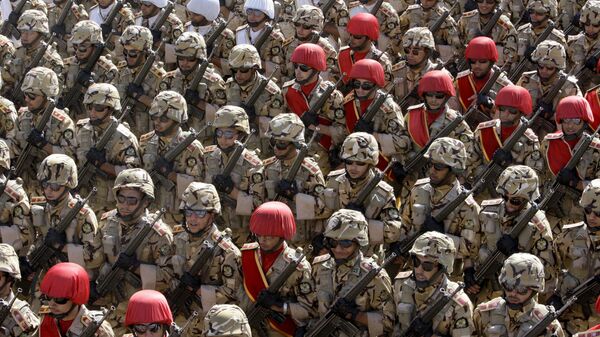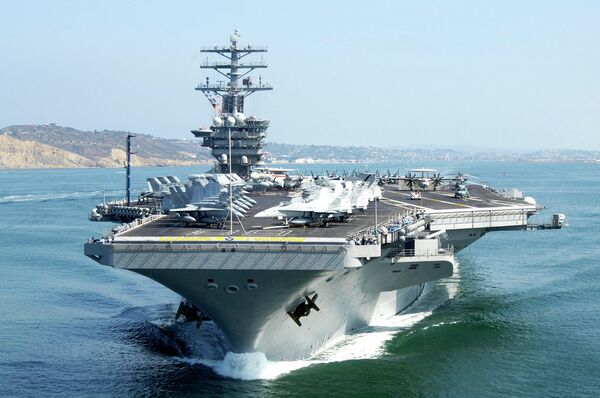Iran has reiterated a warning to the US that it is prepared to defend itself against any aggression by enemy forces in the region.
The Chairman of the Chiefs of Staff of the Iranian Armed Forces Major General Mohammad Baqeri cautioned on Tuesday that the country’s Armed Forces “have fingers on the trigger” to respond to any provocation.
Mohammad Baqeri slammed the ongoing military buildup by the “terrorist and criminal military” of the US in the area as he spoke on the sidelines of a large-scale Iranian Army drill.
“Although the Islamic Republic of Iran has no intention of carrying out an act of aggression and violation against any neighborring country, it is fully ready [to counter] any threat,” Major General Baqeri was quoted by state media as saying.
As he spoke against the backdrop of heightened tension between Iran and the US during President Donald Trump’s final days in office, he added:
“Our heroic Armed Forces have their fingers on the trigger, and in the event of the slightest mistake by the enemies, the Armed Forces will surely give a resolute response.”
Earlier, Commander of the Islamic Revolution Guards Corps (IRGC) Aerospace Division, Brigadier General Amir-Ali Hajizadeh warned certain Arab countries in the region against the adverse consequences of cooperation with the United States and the "Israeli regime", saying they would sustain the most damage in case of any possible war in the region.
“If something happens here (in the region) and a war breaks out, we will make no distinction between the US bases and the countries hosting them,” Hajizadeh said.
Spiralling Iran-US Tensions
The statements by Iran’s top military commander come against the backdrop of large-scale two-day drills by Tehran involving unmanned aerial vehicles (UAV) in the northern province of Semnan.
#Iran army launches 2-day large-scale drone drills including “hundreds of combat, surveillance, reconnaissance drones & electronic warfare.” #Iranian Armed Forces Chief of Staff Major General Mohammad Hossein Baqeri attended the event in a desert area in Semnan province. pic.twitter.com/if2Fd3oRoB
— Habib Abdolhossein (@HAbdolhossein) January 5, 2021
According to Admiral Mahmoud Mousavi, the army’s deputy commander for operations, units from the Ground Force, the Air Defence, the Navy, and the Air Force were to practice “combat, surveillance, reconnaissance, and electronic warfare” utilising “hundreds of operational army drones”.
Accordingly, naval drones would fly from warships in the country’s southern waters, as ‘suicide’ UAVs conduct long-range sorties to hone their skills at destroying hostile targets deep in the enemy’s airspace.
The drills follow the decision of the US on 3 January to reverse an initial plan to bring home its aircraft carrier, the USS Nimitz, from the Persian Gulf.
Acting US Secretary of Defense Christopher Miller had issued the order due to what he described as Iranian threats “against US President Donald Trump and other US government officials..
Earlier, two nuclear-capable American B-52 bombers flew over the Persian Gulf after nonstop flights to the region, while nuclear-powered submarine USS Georgia arrived in the Persian Gulfb accompanied by two American warships.
US-Tehran Verbal Repartee
The developments come as part of a show of strength in the Persian Gulf on the part of Tehran and Washington recently, accompanied by bellicose verbal jousting between the two sides during the one-year anniversary of the assassination by the US military of top Iranian anti-terror commander, Lieutenant General Qasem Soleimani.
A year ago today, 𝘌𝘯𝘦𝘮𝘺 #1 of extremist terrorists was cowardly assassinated by the terrorist-in-chief.
— Javad Zarif (@JZarif) January 3, 2021
As our region solemnly commemorates his one year passing, a reminder that the only beneficiary of his murder is Daesh (ISIS), which has only increased its activity since. pic.twitter.com/bt8pgDvXar
The head of the Islamic Revolutionary Guard Corps' (IRGC) Quds Force was killed in a drone strike near Baghdad International Airport on 3 January 2020, with Iran repeatedly vowing to avenge his death.
As the anniversary of the assassination approached, bilateral tensions, which have persisted since President Donald Trump unilaterally withdrew the US from the 2015 Iran nuclear deal, or the Joint Comprehensive Plan of Action (JCPOA), in May 2018, soared to new heights.
Tensions flared anew after Washington blamed Tehran for a rocket attack on the US Embassy compound in Baghdad on 20 December that killed a local civilian.
The attack on the international zone in Baghdad was denounced by US Secretary of State Mike Pompeo as having been masterminded by "Iranian-backed militias", with Tehran rejecting the allegations.



